|
VIKALP@PRITHVI, Mumbai* Film synopsis: A documentary set in Firanghi Mahal, Lucknow, an institution for rationalist Islamic scholarship founded in the late 17th century. Through two women, Sughra Fatema and her niece Khadija Ansari, it tells the unknown stories of women and their struggles to find their own ways of being in a time of dramatic changes. One wrote poetry to express herself and the other became a student activist who went to jail for being a revolutionary. The film is an ode to humanism and the indomitable spirit of women who refuse to give up the search for a meaningful life. About the Director: Uma Chakravarti is a feminist historian who taught history at Miranda House, Delhi University, where she also curated film screenings of documentary films from the late 70s onwards. She has recently made three films: ‘A Quiet Little Entry’ on women’s history and the small archives of unknown people; a second film on the 1960s and 70s in India, and the way political and social events at that time shaped individual women’s lives titled ‘Fragments of a Past’, and her third film ‘Ek Inquilab Aur Aaya’ which dwells on the multiple histories of Muslim women which we rarely see in documentary cinema. This might be one of the first films I watched about Muslim women's history though limited to Firangi Mahal. Prof. Uma is an amazing personality and she mesmerised her audience with her witty answers. A good number of her students were in the room who enriched the Q&A nicely - sharing about gender and history in India and Lucknow, in particular. The film which recreates the past making it a docu-drama film holds the attention of the audience by moving the stories of two women - Urdu poet Sughra Fatima and her niece Khadija Ansari - amazingly independent thinking women. I realised how little I (and we) know about these women - am there are so many untold stories to be shared of such women. One question I was wondering was about the name Farangi Mahal. Anand Patwardhan nicely raised this issue during the Q&A sessio. The word Firang (meaning foreigners) refers to French owner who was the first owner of this mahal (palace), according Uma, director of this film. It became the center of Islamic learning as well as cultural centre. The film nicely travels the time based on memories, poems by Sughra and walking down the road with Khadija Ansari, the rebellious one, telling her story and involvement in Khilafat movement and loads of emotions. I must admit that though I've not heard about Uma Chakravarti earlier, but she is definitely going to be one of those role model heroes - a young woman in her 70s directing such amazing films. Such an inspiring evening with wonderful people makes a good memory. Scroll.in has published this film's review, read here: https://scroll.in/reel/850967/an-urdu-poet-her-activist-niece-and-two-faces-of-rebellion-at-lucknows-farangi-mahal *Vikalp@Prithvi is an initiative of filmmakers Anand Patwardhan, Simontini Dhuru and Chandini Parekh.
They organise documentary film screenings often with Q&A with the film director Every last Friday of the month at 7 pm At Prithvi House, Opposite Prithvi Theatre, Janki Kutir, Juhu Church Road, Juhu, Bombay. Entry Free on a First-Come-First-Seated Basis Facebook Page: bit.ly/vikalpscreenings Twitter Page: www.twitter.com/Vikalp_Prithvi
0 Comments
After a low-key Onam sadya*, I'd a beautiful evening listening to storytelling, i.e. Qissebaazi in Urdu language. Theatre events in Mumbai used to be known for its punctuality. This is changing rapidly. Today's show got delayed nicely by 20 mins - when it comes to timing I am more Dutch than a Dutch citizen and I arrive 20 mins before time! Anyways, during this 40 mins waiting time I'd a chance to continue playing on phone 'Godot Godot' - with 8 year son of my friend. He acts Pozzo and I'm his Lucky .. This is my second blog on Qissebaazi already in three months! In May, while dealing with Mumbai summer wave, I'd watched for the first time Qissebaazi and I spontaneously became a fan. Since then I have been following this unique storytelling show in Mumbai, which is directed by Danish Husain under his production company, the Hoshruba Repertory. A few days ago, my nephew suggested a couple of indie Hindi films (a fact that I watched more Iranian & Latino films than Bollywood Hindi films) and one of the suggested films I happen to watch on Netflix was Ankhon Dekhi.. a nice surprise to see Husain in this film and to learn he is also a film actor. The two performances lined up for today's event at Hive, the Great Eastern Company, Byculla, Mumbai were in Malayalam and Urdu languages. The uniqueness in appreciating this art form of storytelling lies in the idea to bridge the culture gap breaking language barriers. To me Qissebaazi is one of the most creative form of art using storytelling in a culturally diverse country like India, particularly, more so in this current political scenario. All my indie documentaries under the Landing Together films are multilingual primarily to have a culture of language inclusivity - showcasing diverse ethnic tribal and indigenous peoples' languages bridge nature conservation. For example, when I use different tribal/adivasi languages in my film to narrate a social issue, it brings a deep cultural meaning with power wherein language is not just to share the information/ story, but to show how it shapes protagonist's opinions, perceptions, customs, and builds (or breaks) collective identities. Probably that's another reason why I am better able to connect with Qissebaazi's unique format. Danish Husain's justification to tell stories in different languages works well because of the way he understands his audience and uses creativity in executing the stories. He does so by dividing each story into two languages. A 'core' language is that of the text, and a symbolic 'bridge' language often either in Hindi or English that helps the audience to comprehend the story. By bringing stories in original language(s) in front of an urban-literate audience raises a crucial question about their 'languaculture adaptability' i.e. how do audience from culturally diverse background understand a story in a foreign language that belongs to another culture. Padma Damodaran, opened her story with a Malayalam poem - a tribute to Kerala's fishermen who extended their unconditional support in disaster rescue operations during the recent floods. She picked up a beautiful story, 'Wooden Dolls', written by Karoor Neelakantha Pillai - of course, none from the audience (including me, I was born after his death) knew this famous short story writer. I'm not elaborating the plot here. Padma kept her audience engaged till the end - using Malyalam as core and English as the bridge language. I liked the structure of today's programme wherein Danish did the introduction, followed by Padma's dance-song-story, and finally Danish wrapping up with a nice dastangoi/storytelling from Dastan-e-Amir-Hamza in bilingual - Urdu and Hindi. You might want to attend one of this storytelling events. On my way back home - two hours train journey - looking at August's beautiful Sturgeon full moon made me ponder on how nature and art has been separated in Mumbai's urban setting. I wish we can have some daredevil artists taking their art events to beaches, forts and mountain camps and pushing the urbanites out of their pigeon holes to enjoy theatre, storytelling, dance in relatively natural settings.... But, I doubt whether mainstream audience is ready to leave their popcorn comfort zone of watching commercial Bollywood films. At least I am exploring option to screen my films in open sky theatre.. or forests. Till then time to prepare for my short film screenings, including one in India at Vikalp@Prithvi, Prithvi theatre, Mumbai on Friday, 26/10. *Onam is a harvest festival originated and celebrated in the southern state of Kerala. Onam sadya is a typical traditional homemade food to celebrate this festival. @purabibose.com For a change this blog is not a review. I watched the two films Ghost Hunting and Palestinian Children under Fire. Post screening there was the Q&A that provided further learning .. if you have read the news and recent news (read Ahed Tamimi or the Unseen costs of imprisioning Palestine minors
Vikalp@Prithvi is a monthly series of documentaries and short films followed by a discussion, brought to you by Vikalp: Films for Freedom in collaboration with Prithvi Theatre, on the last Friday of every month at 7 pm. Entry is always free. On July 27, Vikalp@Prithvi screened two films on Palestine followed by Q&A with the director and human rights activists. The first film was 'Palestinian Children Under Fire' Directed by Amal Wahdan Followed by Q&A with Apoorva, South Asia Coordinator at the Palestinian Boycott, Divestment and Sanctions National Committee and Feroze Mithiborwala, General Secretary, India Palestine Solidarity Forum. About the Film: The film catalogues historic and current Israeli human rights abuses perpetrated against Palestinian people, especially children, providing the most up-to-date record of such instances of human rights violations available to date. Amal Wahdan is a Palestinian women and human rights activist and former political prisoner. She was one of the founders of the Unified Leadership of the Intifada 1988. She is the Chairwoman of the Shaikh Hasan Foundation. The second film screening was of 'Ghost Hunting'. Followed by Q&A with Palestinian Director Raed Andoni About the Film: A filmmaker, searching for former inmates of Jerusalem’s Moskobiya interrogation center for a documentary, places a newspaper advertisement in Ramallah. After a casting process, the men reenact their interrogations, discuss details about the prison, and express the humiliation they experienced during detention. For those in Mumbai do visit every last Friday of a month at 7 pm for Vikalp@Prithvi film screening and Q&A at At Prithvi House, Opposite Prithvi Theatre, Janki Kutir, Juhu Church Road, Juhu, Bombay In search of Dariya Sagar
A two hour long play curated by the Blind and the Elephant and directed by Gerish Khemani. I watched in my favourite place G5A.. favourite because of the location. When you've spend you primary and secondary school years in a place called Ulhasnagar you cannot avoid Sindhis. As a child I grew up seeing the transformation in Sindhi community around me. Once I told my mother, "That fat woman with big bumpies came to meet you." I got slapped for being so honest. A hard working community, my widowed mother used to contributing running the house by getting loan by mortgaging her jewellery to one of the Sindhi families in the neighbourhood. One day she lost her mother's only piece of gold pendant and I saw her crying because she was unable to repay the interest rate. I developed special emotions for all Sindhis thereafter... Period. In this background, I took courage to watch this play - more to understand if Gerish Khemani will address what is this lost identity has done to next generation - a majority who continue to live in ghettos/ camp areas. The play was too long.. that would be my first comment to writers Khemani along with Akshat Nigam. The actors did a good job to entertain throughout using appropriate props in between. By break time G5A's Black Box cold temperature was already making many feel drozzzzy ;-) Some audience left during the break time, but I wanted to check out the ending. Oh the music and the singer (didn't get his name) did fabulous job and kept the momentum of the drama alive. About the play, the constant search for identity - Sindhi identity - by the protagonist, Jatin, takes you through the history of India before the divide and the journey to leave the land, memories behind in Sindh to adopt a new home. Dreams, ghosts, story-telling of two lovers, and displaced community all these elements nicely twisted in the script gave a nice theatrical experience. Entertainment. As I walked out of the theatre, I remembered my childhood friend Dolly whose grandmother 'amma' used to tell us stories of why she converted to adopt Sikh culture. Amma would tell us stories of how before partition they had to leave all their ornaments in a trunk that they hid in a well. She would say it was the trunk where she left her Sindhi identity. Now they are Punjabis. Dolly's father was brought up like a Sikh family. Amazing how identity gets lost and new identity is created.. you cannot have the luxury to not have any identity - can you?! @purabibose.com The blog post do not allow me to know who liked the post! Thank you anyways for reading and liking it. Mumbai Local - what a beautiful concept initiated by Junoon. Mumbai Local, co-founded by Sameera Iyengar and Sanjana Kapoor, is a platform to make theatre and the arts accessible. Three monthly events are organized: Bandra every 1st Saturday at Mcubed Library; Fort every 3rd Friday at Kitab Khana; and Byculla every 2nd Sunday at Bhau Daji Lad Museum. In the late 1990s, during my college days at Nirmala Niketan Home Science and TISS, we were regulars @Prithvi Theatre and NCPA... one of the few hangout spaces in the city (suburban areas continue to lack such space) to enjoy theatre. In 2015, when I took sabbatical and came home, I was surprised to see the cultural transformation happening in Mumbai, albeit slowly. I couldn't give time to explore these spaces because I was filming in the forested and tribal districts all over India. It is only since February 2018, I began to catch up Mumbai's changing cultural space during the weekends. A good escape after full time five days of editing a week of Landing Together films. How I picked up today's event? Thanks to Devashish's trick to use a provocative title to fuel an anthropologist/ environmentalist like me. Voicing the Voiceless: Fighting to Express by Devashish Makhija, filmmaker, graphic artist and poet. Like usual, not being a Bollywood film buff having watched only two Bollywood mainstream dramas in the last four years: Newton and Bioscopewala, I didn't knew much about Debashish Makhija. My film editor, who'd seen Devashish's film 'Ajji', was totally impressed and suggested that I've to watch his films before I go to this event. Of course I couldn't watch any films beforehand. Though I dislike the idea to do google search about people, but what do you do when you've to travel 75 min in Mumbai Local from Ambernath to CSMT. One of the first few searches was one of his film Oonga and its Wikipedia page reads "Little adivasi Oonga misses his village school trip to see the Ramayana. ..... [He] is stunned to see that Rama is everything that the adivasi are - gentle, brave, a forest dweller and protector of mother-earth Sita." Reading the plot made me wonder what to expect from this event. Devashish nicely opened up the session introducing his work of being a writer and filmmaker. A typical Bollywood success story - struggle in the early years and passion for story telling about the marginalised communities using the 'Anthropocentric' approach in the so-called 'mainstream' Bollywood films. Uh-huh - a modern day filmmaker.... yes, he actually used that word Anthropocene and it kind of fits the argument after you've watched his films! A term used by environmentalists (thanks to a Dutch Noble Prize winning chemist, Crutzen, P.) Anthropocene is a way to analyse the current age wherein humans are seen as a core factor influencing earth's climate and environment. Like (most) social scientists, he tried to disassociate by acknowledging his intended yet unintended choice for the title of the event, including keywords 'marginal' people and 'mainstream films'. Short Films: Doing the Business as Unusual Devashish shared his journey of how he tumbled upon writing a children's story book 'When Ali became Bajarangbali'. We also got to watch his three short films 'Rahim murge pe mat ro', 'Agli Baar', and 'Tandav' plus trailer of one of his recent feature length films 'Ajji'. I was now finding even harder to digest why his film Oonga got shelved, and why would he treat Oonga's plot in a way which happens to be so unlike him. These three short films are brilliantly done despite the fact it was also small budget films. I think it is easy to make a feature length, but to venture into short films you got to have guts to kill your audience in that 10 mins. In brief, these short films also establish Devashish's unique approach towards difficult socio-political subjects (slum displacements, threats to minorities, violence, and government and its governance) with minimum dialogues and loads of camera action - which is worth appreciating. I'm impressed. The only time when we saw Devashish losing his otherwise cool and composed style in this event was with this one question during Q&A. The question: how being a man he could give justice to depict the women's issue -- read: rape and revenge -- in the film Ajji. Gender inclusion is not just about women, but we rarely talk about how it affects men to defend their stand. Here I wished Devashish could've used this opportunity to open up the floor to allow Ajii's lead actor, Sushama Deshpande, who was in the audience to share her experience of working with him. I did get a chance to ask him during the Q&A about his shelved film Oonga. A response good enough to understand the challenge of any filmmaker. How can one re-define the established category of 'art' as Bollywood's 'mainstream' film (?) Listening to him the way he narrated the story of Oonga I wished the film was released. He is just a lucky guy to get funding to make a film with big actors with a powerful story - as per how he narrated his original story and not what I read in Wikipedia. Hope someday this film gets released and screened. The big advantage in making a fiction film like Oonga is the freedom for the Director to use narration without worrying about facts and/or romanticising the details. For my Landing Together indie multilingual documentary first feature length film that we completed yesterday we were dependent on our protagonists - the real life tribal people and forest department officials - without any chance to decide a story in advance. A few unanswered questions - why 'adivasi' topics unlike religious ones fail to ripple and create its own niche (economic market) in India's film industry, or do we need to add love story twist (like Newton) to make it more public. This would need a separate space and time and an audience who'd be interested. Then again, can films alter India's unending love for 'mainstreaming' its tribal population... guess not. Watch the event here https://www.facebook.com/junoontheatre/videos/1693645940753888/ It includes discussion on various topics like film censorship, his experience of script writing and associated risk of ideas being stolen, pros and cons of online viewership of films, his journey of writing books about animals and getting his book included as part of the CBSE curriculum and publishing in nine regional languages among his many other talents as an artist. @purabibose.com I try to pick up two events per month therefore couldn't write a review of my first Mumbai Local experience with Anurupa Roy and Gunduraju 'When Puppets Speak' in Bandra's Mcubbed Library.
When Puppets Speak They refreshed my memories of assisting Wayang Kulit artists in Java island while I was working in Indonesia in early 2000s. I'd organised one such event in my Bogor home. The event turned out to be quite a ritual from midnight to early morning and most of the guests couldn't stay awake! Gunduraju's passion to carry puppetry tradition also stems from temple rituals - that's how the story telling existed in the early years. After reciting poems he explained its meaning and how political satire was smartly integrated in handling as well as designing the shadow puppets. Junoon Local Mumbai Event could be explained in one Bengali word, Adda, wherein you get to mingle with the presenter(s) during the talk and get to make sense of their passion in arts - a platform worth exploring. @purabibose.com The blog post do not allow me to know who liked the post! Thank you anyways for reading and liking it. Including his poems and travelogues among many other hats, Ibn-e-Insha has also been regarded as one of the best humorists of Urdu. 'Urdu Ki Akhari Kitab' is one of his brilliant work touching on our education system. Though he wrote this book a few decades ago, but it unfortunately continues to be relevant even today. I'd the honour to watch (once again Danish Husain) a play with the same title at Prithvi theatre, Mumbai. My short-term interest in primary education was inculcated in college while interning at one of the Aga Khan Schools in Dongri, and at TISS with Jeroo Billimoria. I have this paper-back thin worn out book, Urdu ki Akhari Kitab, somewhere in back of my book shelf that I'd bought on my way back from first ever trip to Agra .... would read everything on education system from Paulo Freire, Jean Dreze to Ibn-e-Insha and Pierre Bourdieu. Those days I was working with Pratham Education Foundation, Mumbai assisting the the Shatak Zhep programme i.e. making Maths a fun subject through play-way in primary municipal schools of Mumbai. Yet, it was just one incident that changed my decision to discontinue interest in education - that early morning of July when I got stuck in one of Pratham's selected Ghatkopar municipal schools in Ramabai Ambedkar Nagar in 1997. The first-hand experience of seeing violence in my fieldwork area was enough for me to change my career trajectory to move out of Mumbai, and focus on tribal development. Danish Husain super brilliantly directs this play bringing in soft touches of contemporary issues. He acted along with Yasir Iftikhar Khan. The 70 min performance could be categorised as a satire, or stand-up type comedies. Doesn't matter how you identify, it is all about putting the dose in a small capsule that makes you laugh even if its a bitter truth. Let me put it this way, I was a bit baffled at times when audience continued to laugh... In fact, in the last scene - where one of the characters sitting among the audience challenge Husain and runs behind him to attack - I was wondering what's so hilarious in this, but perhaps that's the reality too, that we continue to laugh even in real life incidences around us! Satirical to the core. Both Iftikhar Khan and Danish Husain will steal your heart.. i.e. if you allow yourself by being in the show! You don't need to read the book before you watch this show.. the actors will explain you all about the style Ibn-e-Insha adopted such as asking a few questions after each chapter of History, Science, Maths, Geography... Music
Varun Gupta on tabla and Shantanu Helrekar on harmonium deliver spot on music. Shantanu's vocal could actually beat Tan Sen - amazing voice. All songs/poems are brilliantly lined up in the script. The use of audiovisuals in the background kind of merges with the mood of the theme that is presented. Good work by Danish Husain in giving the due recognition to Ibn-e-Insha's this piece of work, and building those lost connections of our cultural geography. @purabibose.com Under the direction of K.K. Raina and conception, script and presentation by Ila Arun, Shabd Leela was presented at Experimental Theatre, NCPA, Mumbai. This two hour long event was an amalgamation of extracts from the works of Dr. Dharamvir Bharti, the award winning novelist, poet and playwright. The play was presented as a dramatised reading and enactment of his works from Andha Yug, Kanupriya and Ek Sahityik Ke Prem Patra, a personal collection of letters to his (second) wife. The only book I read was Kanupriya and it was a long time ago.. during school days. I think it didn't impress me.. may be because it used scholarly Hindi language and/or I was too young to comprehend the story in details. Well, the main intention for me to watch this play was to see Ila Arun performing. I only knew her as the singer of 'Mera assi kali ka' and it was in those days one of my favourite dance songs! Ila Arun performed the role of 'sutradhar' or compere/narrator and then she also interchanged her role as Pushpa Bharati and Gandhari. The concept is brilliant. The wife-husband duo, Rajeshwari Sachdev and Varun Badola did a fabulous performance as Pushpa Bharti and Dharamvir Bharti. I am totally biased towards Rajeshwari Sachdev after seeing her mesmerising performance in Lillete Dubey's Gauhar at Prithvi theatre last year. I was hoping she would sing again and I was glad that she was given tUhe opportunity to use her sweet voice. The rest of the cast, including K.K. Raina, kept the audience engaged. As an International Development professional, ask me how much I hate PowerPoint presentations. It is obvious that I disliked the idea of using slideshow/projected visuals in the background. I think it is becoming a trend to use slideshows in theatre performances as if the audience is creatively idiot to visualize the image/situation, therefore the need to feed them. Perhaps, it might be true ;-) This drama nicely interweaves the romantic lives of Bharati and his second wife; though, little is shared about his first wife. That's where I've a problem in conceptualization of this play. Yet, the overarching idea of showing Radha from Kanupriya kind of merging nicely in the storyline. The letters are nicely read - and I kept wondering if at all any of my boyfriends ever dare to write to me such heavy letters it will be 'the end' before beginning of our love story - and Ila Arun pulls my mind back from wandering away. She nicely mentions in her dialogue "Imagine how Dr. Bharti would've written these letters in WhatsApp age - with all the hashtags! These among many other tits-bits are integrated also through Mahabharata epic war in this drama to make the plays, stories and letters as relevant as possible to today's political circumstances. Overall, a relatively good experimentation of using different mediums - letters, biography, personal stories, and books of Dr. Bharati. @purabibose.com |
Privacy Policy: We use Google Analytics to collect data to improve the Website. By using and accessing the website you are consenting to use of Google Analytics. All Rights Reserved.
ARchIvES
March 2019
CATEGORIES
All
Privacy Policy: This website uses Google Analytics to improve the Website. By using and accessing the website you are consenting to use of Google Analytics.
|
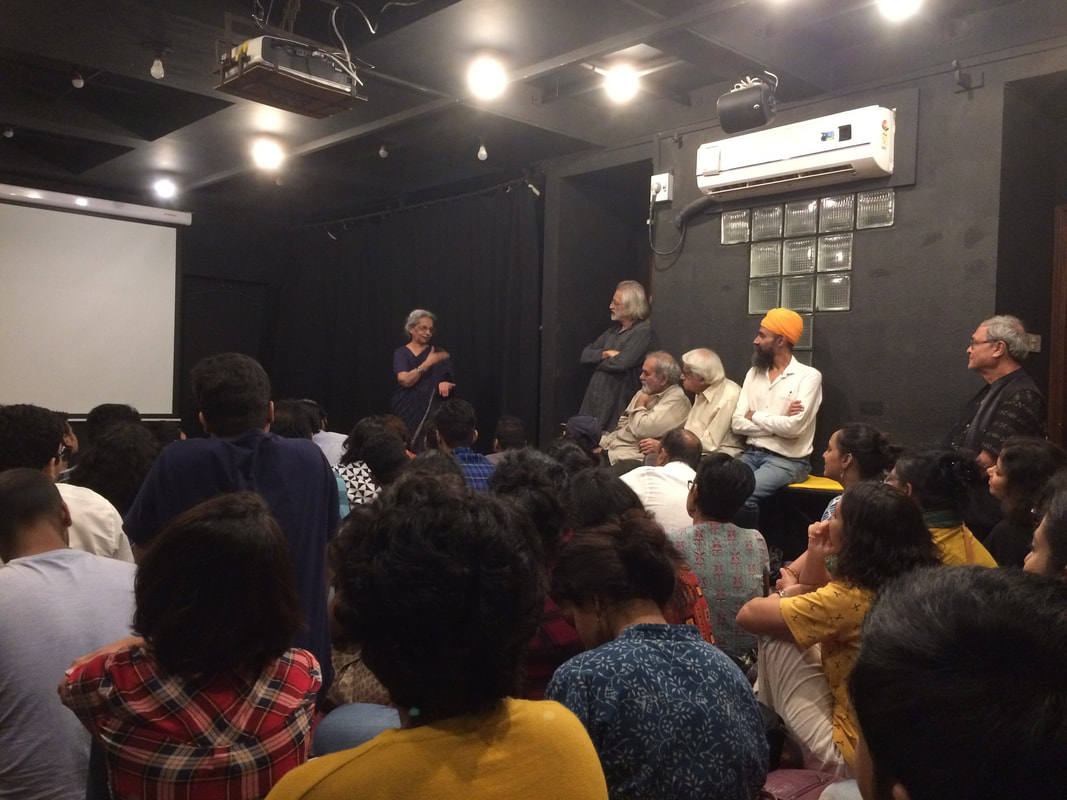
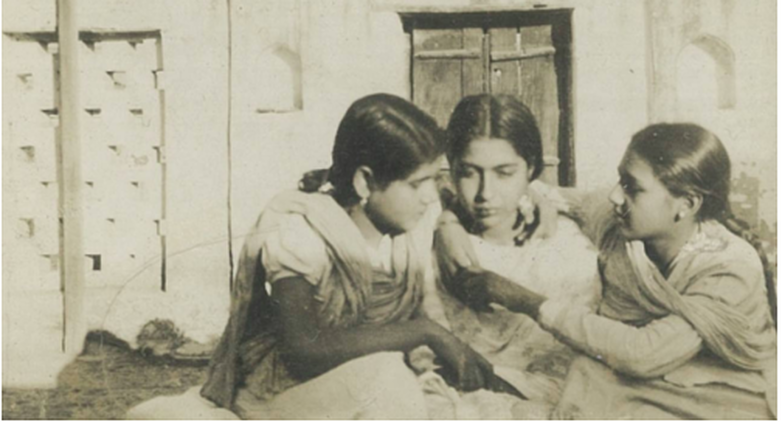
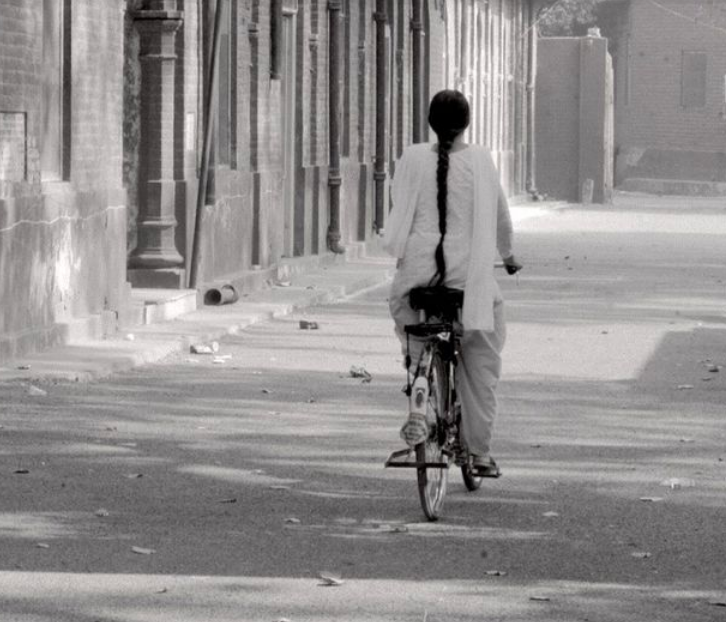
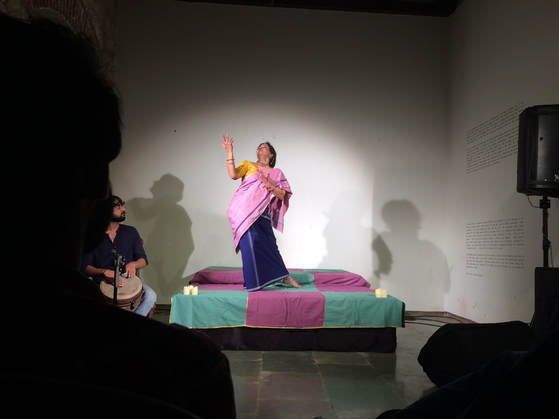
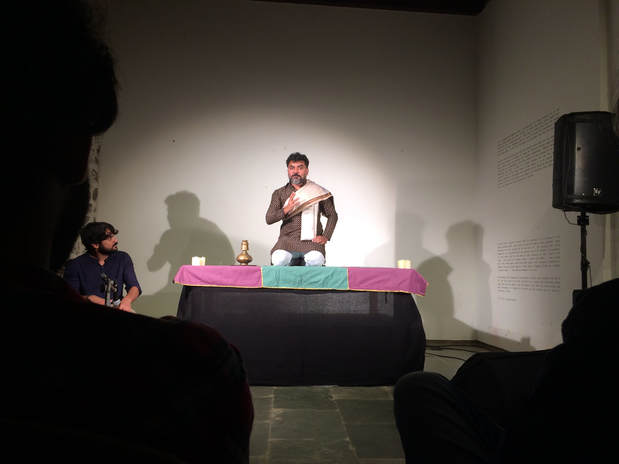
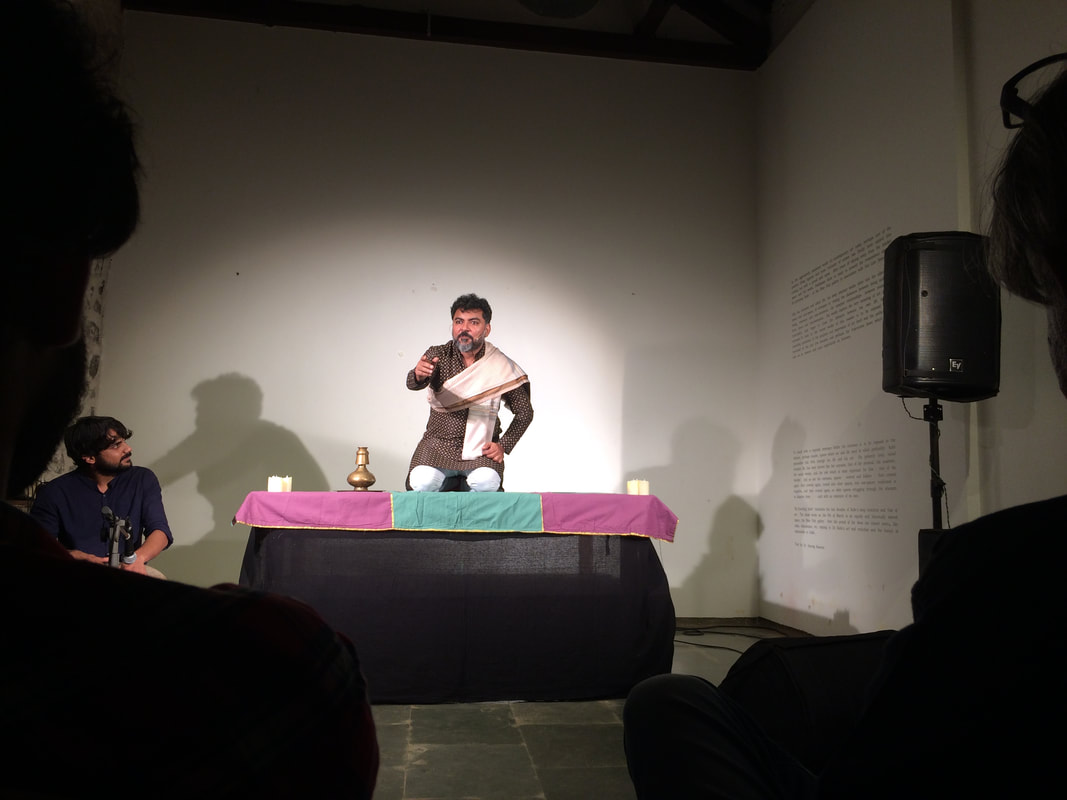
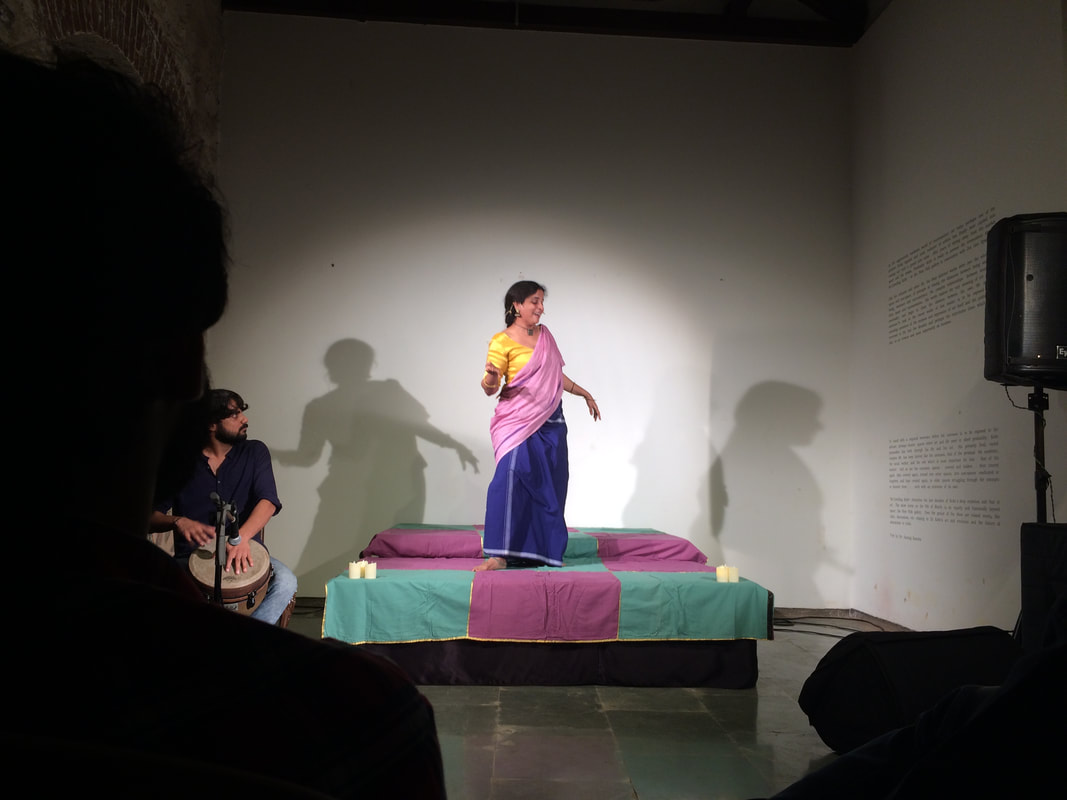
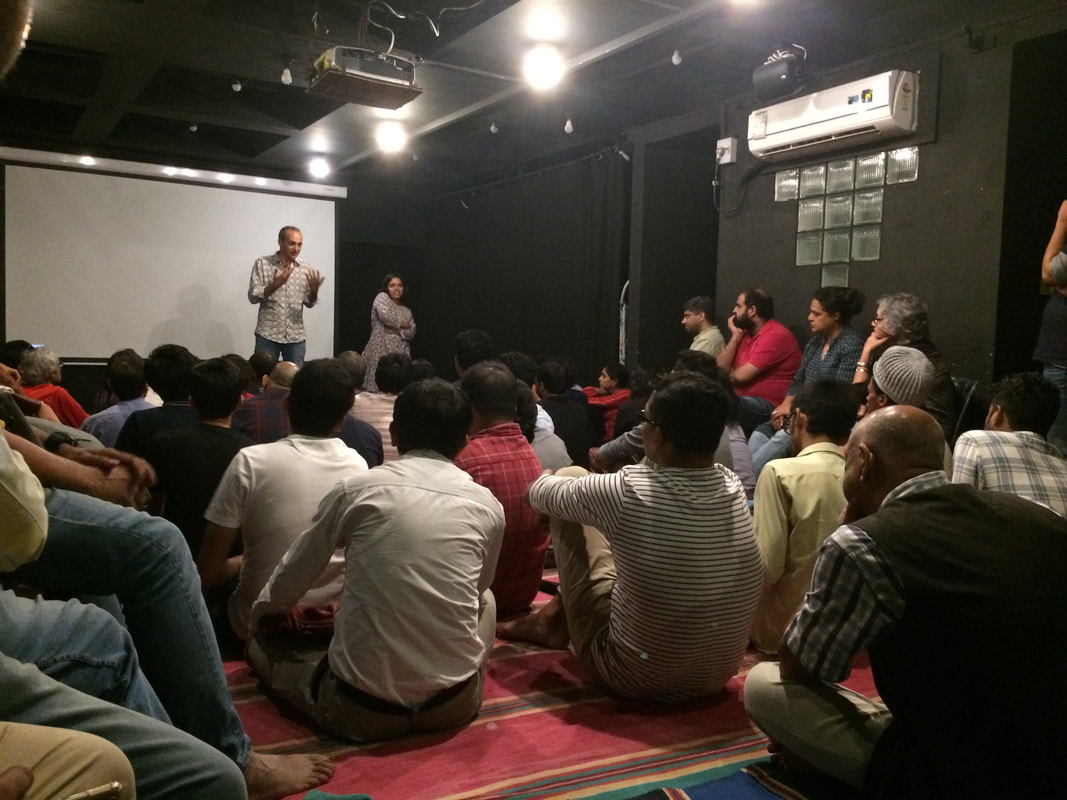
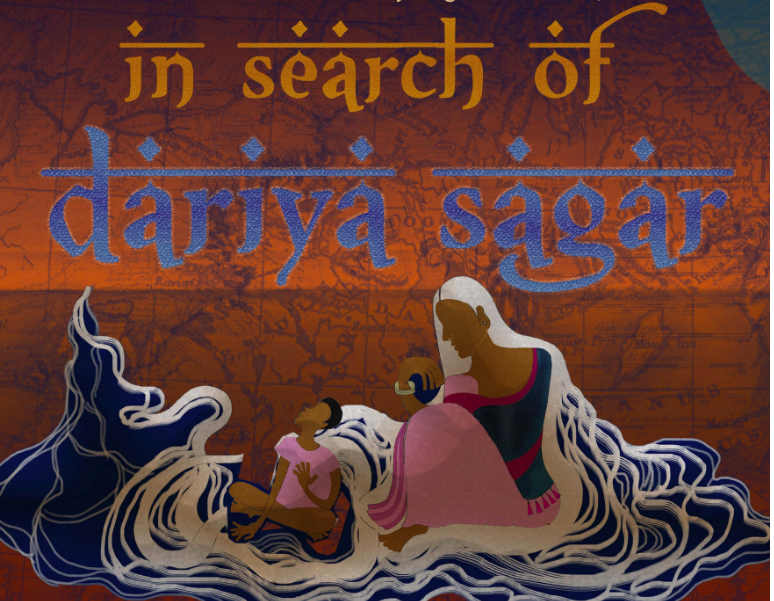
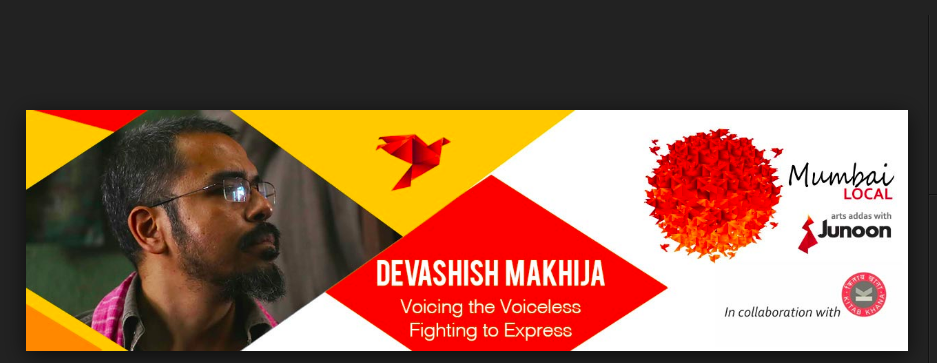
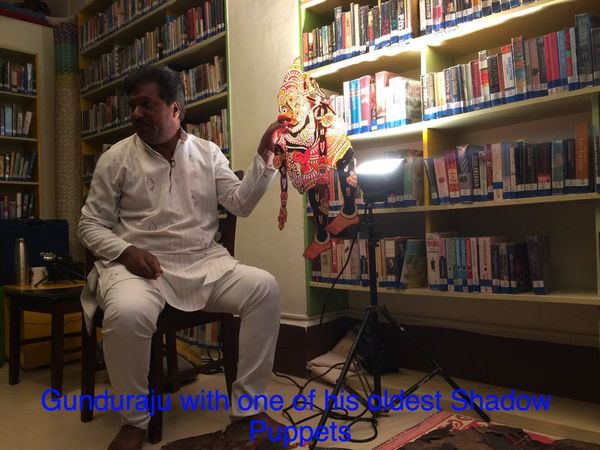
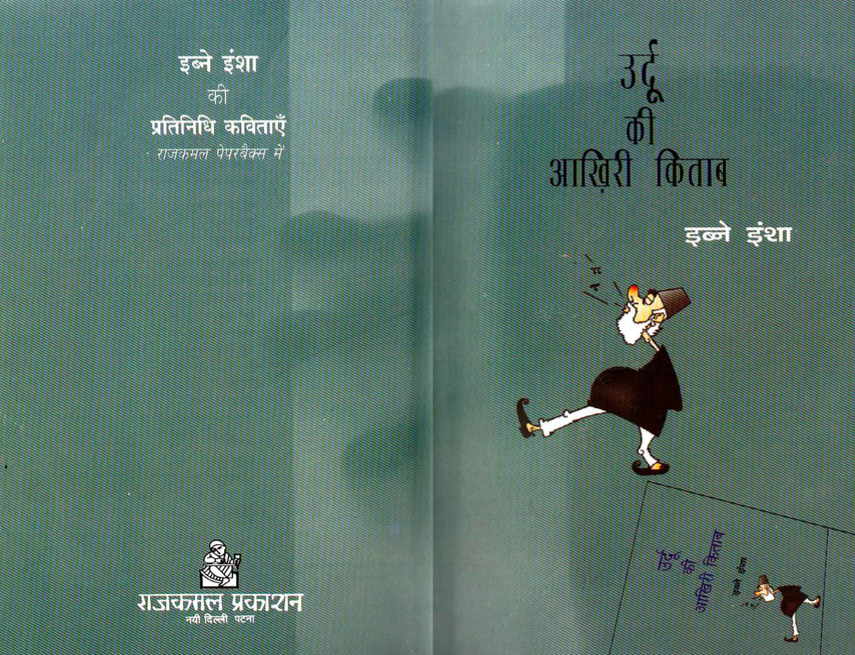
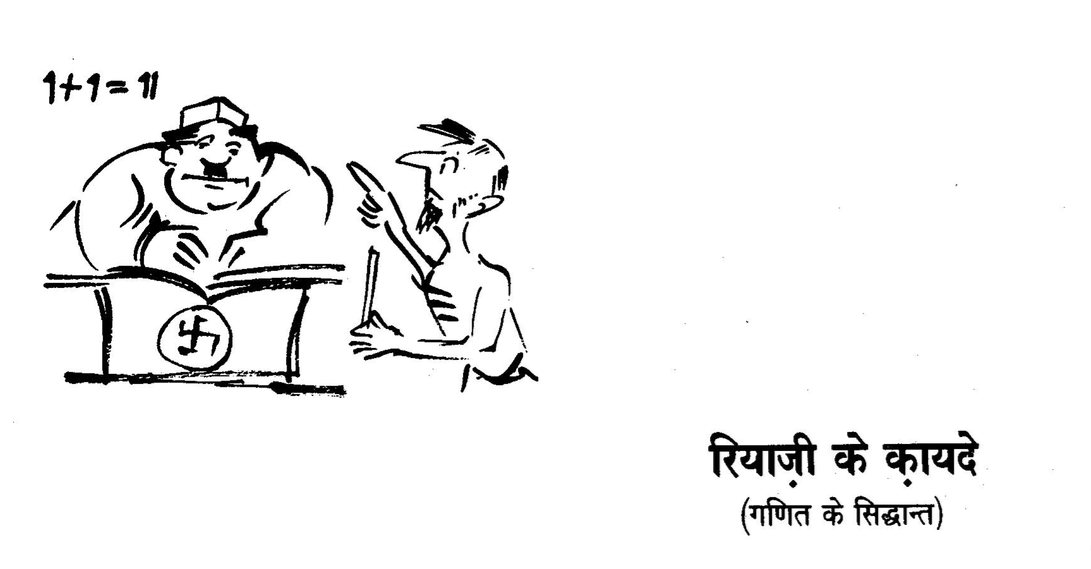
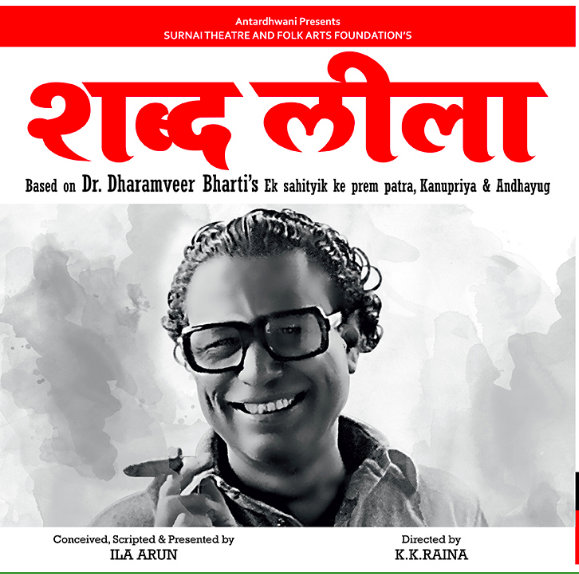
 RSS Feed
RSS Feed
